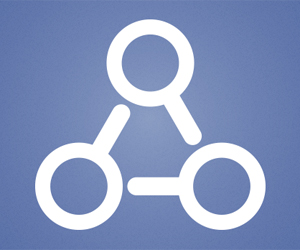Yesterday Facebook announced its biggest innovation since the News Feed in 2006. It is finally taking search seriously, launching Graph Search.
What Google is to the web, Graph Search is to your social network on Facebook. Graph Search, which will appear on the top of every Facebook page, enables people to find information through the filter of their friends in relation to four pillars—people, places, photos and interests. With Graph Search, people type in what they’re looking to find, not just by name but also by category or simple phrase.
Whether you are a Page, place, group, app or game, you and the content you share can appear in search results according to the information you have shared and the connections you have.
Some examples of queries could be:
- People who like volleyball and live in my city
- Jazz clubs in Seattle that my friends like
- Photos of my friends before 1998
- Favorite TV shows of my friends who like The Walking Dead
Currently Graph Search is in a limited beta, and there are no details on when it will be widely released. It’s intended to launch as an iterative product that will improve and evolve as user feedback is collected.
Search Is Serious Business
While some of those queries may seem superfluous (who cares about old photos?), Graph Search isn’t something to be taken lightly. Facebook’s inherent value is its data. No other product, service or website knows as much about you as Facebook does, and that information is powerful.
When I traveled to a new city and wanted to find a good restaurant, I’d turn to a cumbersome combination of Yelp, Foursquare, Google Maps and TripAdvisor. However useful that information may ultimately be, it rarely connected with my social graph. With Graph Search, I can simply search for “Restaurants in Cleveland that my friends like” and, presuming they’ve actually Liked any Cleveland restaurants, I’m provided with options I can trust.
This type of searching becomes even more important as consumers trust brands less and less and consequently depend on friends, friends of friends, and complete strangers to recommend movies to see, restaurants to visits, hotels to stay at, products to buy and more. It is now the fans that are marketing for brands, whether the brands like it or not.
What Graph Search Means for Brands
If you weren’t concerned about your brand’s social footprint, you have cause for concern now. Graph Search puts the onus on brands to connect with the right types of fans (another reason buying Likes is a scam) on its Page and give its fans reasons to interact with its content on an ongoing basis. By increasing engagement metrics, which signals to Facebook that a Page is relevant, a brand stands to benefit in Graph Search results.
Here are four essential concepts to keep in mind:
- Make sure your Facebook Page is up-to-date with all relevant information, especially location (particularly for restaurants, clubs, theaters, etc.). Also, make sure your brand or business is categorized correctly.
- While a high fan count can signal interest, Facebook’s EdgeRank algorithm rewards relevance. It’s not about how many fans you have; it’s about how many of them are engaging with your content. Try to acquire fans who are right for your brand because they are the ones who will comment, Like and share and often have friends who would be equally interested.
- Strong connections are important not only for engagement but also because, per Facebook, “results are ordered based on a user’s relationships with his or her friends, so it’s not just the number of fans or users but also the strength of those connections that are important.” This means that fostering a tight-knit community that has shared interests will boost your ranking in search results.
- Consistent engagement means consistent content. Make sure your brand has a content plan mapped out and the skills and manpower necessary to keep the conversation going.
- Currently there’s no paid placement. The only way to have your brand appear in results is to make sure it appears relevant to Facebook.
Head over to Facebook Studio to read Facebook’s take on how Graph Search can help people discover your business.
Privacy
The fact that Facebook has created a search engine for Facebook content doesn’t mean that all content is public. On the contrary, all content that is currently private will remain private, to the degree determined by each user’s privacy settings. Facebook has already released a video covering some of the privacy concerns.
Year One
The beta launch is just the first step, and Facebook CEO Mark Zuckerberg admits that this is a project that will evolve over the next few years. Just as the News Feed was the first step toward Brand Pages, Graph Search has a world of possibilities ahead of it.
Currently Graph Search is in beta. The best course of action for brands this early on is to make sure that their Pages are up-to-date and consistently creating content that audiences want to engage with and share.
*Additional reporting from Luke Dringoli

